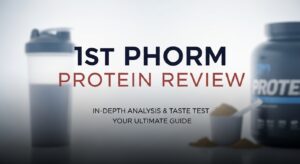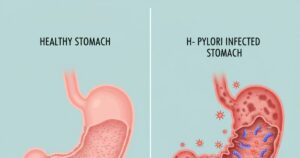Powder supplements for gut health changed everything for me.
Listen, I used to be that person swallowing 15 capsules every morning like I was popping Smarties.
My bathroom counter looked like a pharmacy exploded.
Then I discovered powder supplements and realized I’d been doing this the hard way.
Table of Contents
Why Your Gut Health Actually Matters (Spoiler: It’s Everything)
Your gut isn’t just about avoiding awkward stomach rumbles during meetings.
It’s running the show behind the scenes.
Poor gut health shows up as:
- Constant bloating that makes you look pregnant
- Energy crashes that hit harder than a Monday morning
- Mood swings that confuse even you
- Getting sick every time someone sneezes within a 5-mile radius
I learned this the hard way when my digestive system basically went on strike for three months.
The Real Deal About Powder Supplements for Gut Health
Here’s what nobody tells you about gut health powder supplements:
They work faster than capsules.
Why?
Your body doesn’t need to break down a capsule shell first.
The nutrients hit your system immediately.
Plus, you can actually taste what you’re putting in your body (which sounds gross but is actually brilliant).
What Makes Powder Supplements Different
Absorption rate: 85-95% vs 10-20% for some capsules
Customization: Mix with anything you want
Dosage control: Start small, build up gradually
No fillers: Most quality powders skip the binding agents
The Big 3: Types of Powder Supplements for Gut Health
1. Greens Powders (The Overachievers)
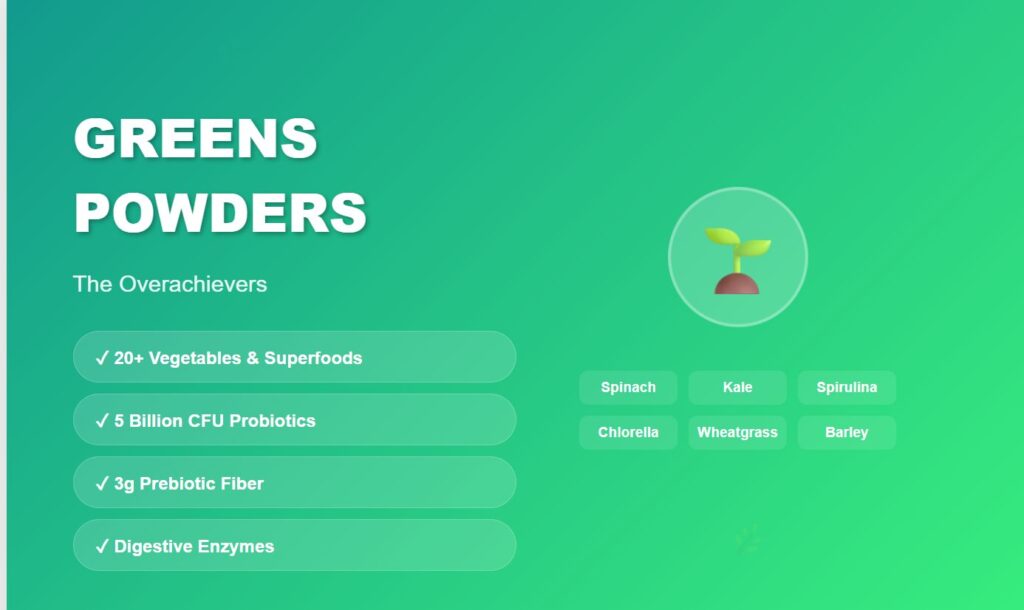
These are like having a salad bar in powder form.
Live it Up Super Greens became my daily ritual because it packs:
- 20+ vegetables and superfoods
- 5 billion CFU probiotics
- 3 grams of prebiotic fiber
- Digestive enzymes that actually work
I mix it with coconut water every morning.
Tastes like a garden smoothie (in a good way).
2. Probiotic Powders (The Gut Repair Crew)
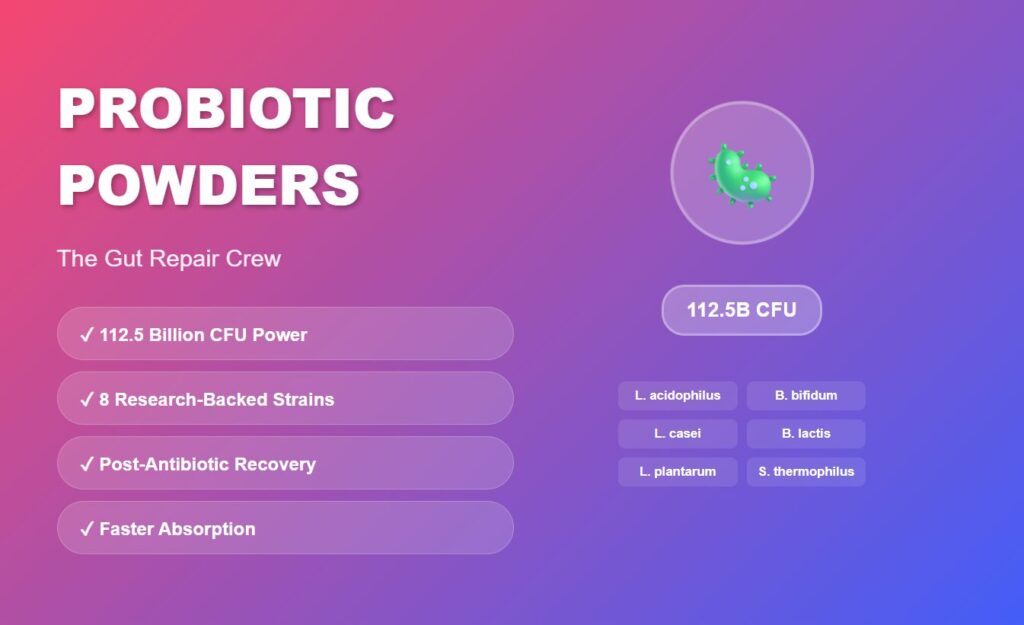
These focus purely on beneficial bacteria.
VSL#3 comes in powder form with 112.5 billion CFU.
That’s like sending a small army to fix your gut.
Perfect if you’ve just finished antibiotics and need to rebuild your gut microbiome.
3. Fiber Powders (The Digestive Brooms)
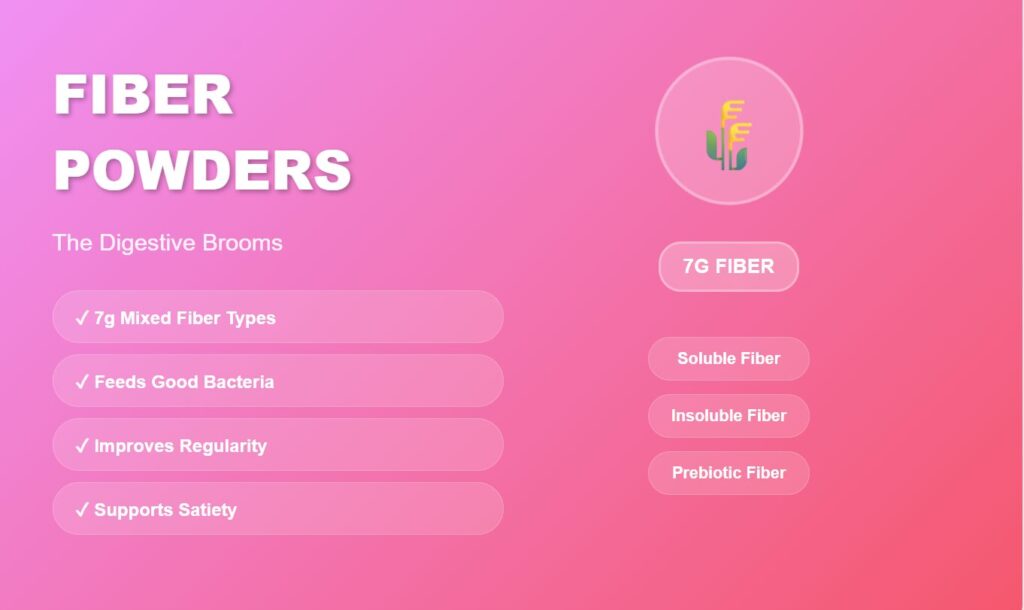
Thorne FiberMend taught me that not all fiber is created equal.
7 grams of mixed fiber types:
- Soluble fiber (feeds good bacteria)
- Insoluble fiber (keeps things moving)
- Prebiotic fiber (gut bacteria food)
How I Choose the Right Powder Supplement for Gut Health
Step 1: Identify Your Gut Issues
Bloating and gas? → Look for digestive enzymes + probiotics
Constipation? → Focus on fiber content (aim for 5-7 grams)
Post-antibiotic? → High CFU probiotics (10+ billion) Generally healthy but want prevention? → All-in-one greens powder
Step 2: Check the Ingredient Quality
I only buy supplements that are:
- Third-party tested (non-negotiable)
- GMP certified (quality manufacturing)
- Organic when possible (especially for greens)
- No artificial sweeteners (these can mess with gut bacteria)
Step 3: Start Low, Go Slow
This is where most people mess up.
Don’t go from zero vegetables to a full scoop of greens powder overnight.
Your gut will revolt.
Week 1: Half scoop every other day
Week 2: Half scoop daily
Week 3: Three-quarter scoop daily
Week 4: Full scoop
The Brands I Actually Trust (And Why)
Live it Up Super Greens
Price: £1.33 per serving
Why I love it:
Complete package – vegetables, probiotics, fiber, enzymes
Best for: People who want everything in one scoop
Downside: Only available on their website
VSL#3 Probiotic Powder
Price: Check pricing Here
Why it works: Massive CFU count, research-backed strains
Best for: Serious gut repair after illness or antibiotics
Downside: Needs refrigeration (pain for travel)
Thorne FiberMend
Price: Check Pricing Here
Why it’s solid: Clean fiber blend, no unnecessary extras
Best for: People who just need more fiber
Downside: You’ll need separate probiotics
How to Actually Use Powder Supplements for Gut Health
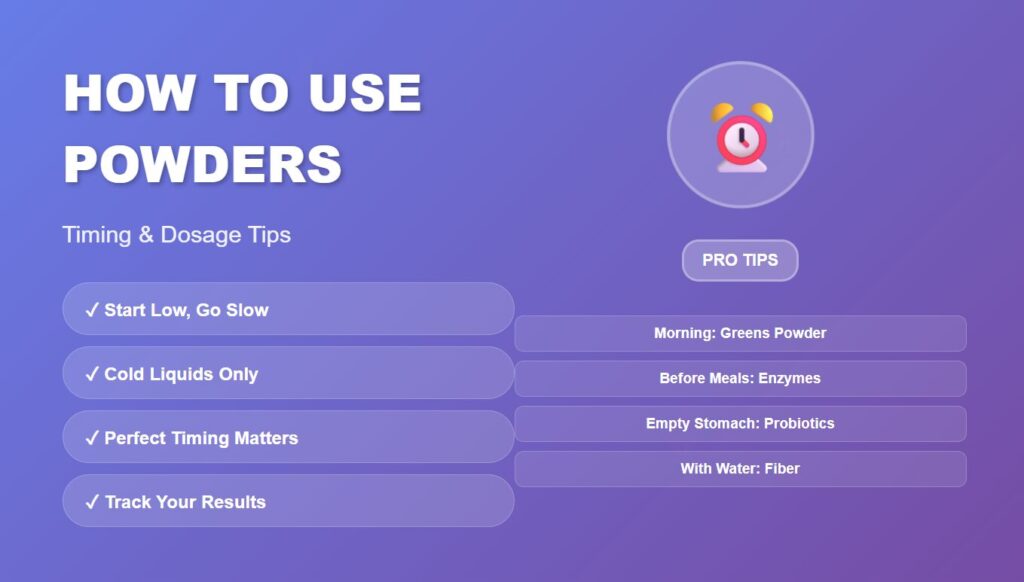
The Morning Routine That Changed My Life
7 AM: Glass of water (gut prep)
7:15 AM: Greens powder in coconut water
Breakfast: 30 minutes later (gives the probiotics time to work)
Mixing Tips That Actually Matter
Cold liquids only for probiotics (heat kills them) Shake, don’t stir (better mixing) Drink immediately (don’t let it sit) Start with 200ml liquid then add more if needed
Red Flags to Avoid in Gut Health Powders
Artificial sweeteners: Aspartame, sucralose mess with gut bacteria
Proprietary blends: Can’t see individual ingredient amounts
Too many plants: Over 35 plants usually means ineffective dosing
No third-party testing: You’re gambling with your health
Unrealistic claims: “Cure IBS in 7 days” type nonsense
What Nobody Tells You About Powder Supplements
The First Week Sucks
Your gut might rebel initially.
Bloating, gas, weird bathroom schedules.
This is normal.
Your gut microbiome is adjusting to new inputs.
Push through unless symptoms are severe.
Timing Actually Matters
Probiotics: Empty stomach or with minimal food Fiber: With plenty of water throughout the day Digestive enzymes: 15-30 minutes before meals Greens powders: Morning for energy, avoid late evening
The 30-Plant Rule
Research shows eating 30 different plants per week creates the healthiest gut bacteria diversity.
Most people eat about 12.
A quality greens powder gets you halfway there in one scoop.
How to Track if Your Powder Supplement Is Working
Week 1-2: The Adjustment Phase
- Energy levels (should improve)
- Digestive regularity (may be irregular initially)
- Bloating patterns (might increase temporarily)
Week 3-4: The Sweet Spot
- Better energy throughout the day
- Regular bowel movements (1-3 times daily)
- Less bloating after meals
- Improved mood (gut-brain connection is real)
Month 2+: The Long Game
- Fewer sick days
- Better sleep quality
- Clearer skin
- Stable energy without crashes
The Mistakes I Made (So You Don’t Have To)
Mistake #1: Going Too Hard Too Fast
Started with full scoops of everything. Spent a week feeling like a balloon animal. Solution: Gradual introduction is everything.
Mistake #2: Mixing Everything Together
Threw probiotics, fiber, and protein powder in one shake. Created a science experiment that tasted like punishment. Solution: Space out different supplement types.
Mistake #3: Ignoring Food Sources
Thought supplements could replace actual vegetables. Spoiler alert: They can’t. Solution: Supplements support a good diet, they don’t replace it.
The Real Talk: Do Powder Supplements for Gut Health Actually Work?
Short answer: Yes, if you choose quality products and use them consistently.
Long answer: They’re not magic bullets.
I still eat probiotic foods like yoghurt and kimchi. I still aim for 25+ grams of fiber from actual food. I still drink plenty of water and manage stress.
The powder supplements just fill the gaps where my diet falls short.
And honestly, they make hitting my nutrition targets way easier.
Budget-Friendly Options That Don’t Suck
DIY Approach
Psyllium husk powder: £0.20 per serving (pure fiber)
Basic probiotic powder: £0.80 per serving
Green superfood blend: £1.00 per serving Total: £2.00 per day
Premium All-in-One
Live it Up Super Greens: Gets you everything in one go. Often cheaper than buying separately.
When Powder Supplements Aren’t the Answer
Severe digestive conditions: See a gastroenterologist first
Active infections: Antibiotics before probiotics
Extreme reactions: Some people genuinely can’t tolerate certain fibers
Medication interactions: Always check with your GP
My Current Stack (What I Actually Take)
Monday-Friday: Live it Up Super Greens
Weekends: Just focus on whole foods
Post-travel: VSL#3 for a week (travel destroys gut bacteria)
During stress: Extra fiber powder (stress messes with digestion)
This isn’t complicated.
Find what works, stick with it, adjust as needed.
The Bottom Line on Powder Supplements for Gut Health
Your gut affects everything.
Powder supplements make supporting it simpler.
Start with one quality product, give it 4-6 weeks, track how you feel.
If it’s working, brilliant.
If not, try something else.
The worst thing you can do is nothing.
Your future self will thank you for taking care of your gut today.
And trust me, when your energy levels stabilize and you stop feeling like a human balloon after meals, you’ll wonder why you waited so long to try powder supplements for gut health.
Frequently Asked Questions
How long do powder supplements for gut health take to work?
Most people notice digestive improvements within 2-4 weeks of consistent use. Energy and mood changes often appear first, followed by better regularity and reduced bloating. Give any new supplement at least 6 weeks before deciding if it’s working.
Can I mix different gut health powders together?
Generally yes, but start with one at a time to see how your body responds. Avoid mixing high-fiber powders with probiotics immediately – space them 30 minutes apart for best absorption.
Are powder supplements better than capsules for gut health?
Powders typically absorb faster and allow for better dose customization. However, capsules are more convenient for travel and some people prefer them. Both can be effective when quality standards are met.
What’s the best time to take gut health powder supplements?
Probiotics: Empty stomach (morning or bedtime) Fiber powders: With meals or between meals with plenty of water Greens powders: Morning for energy boost Digestive enzymes: 15-30 minutes before eating
How much should I spend on gut health powder supplements?
Quality options range from £0.80-£2.00 per serving. Spending under £0.50 usually means poor quality ingredients. Over £3.00 per serving often includes unnecessary marketing markup.
Can powder supplements replace eating vegetables?
No. Supplements support a healthy diet but can’t replace whole foods. Aim for variety in actual vegetables whilst using powders to fill nutritional gaps and boost your daily plant intake.
What side effects should I expect from gut health powders?
Initial gas, bloating, or changes in bowel movements are normal for the first 1-2 weeks. Severe cramping, persistent diarrhoea, or allergic reactions warrant stopping immediately and consulting a healthcare provider.
Do I need to refrigerate all gut health powder supplements?
Only probiotic powders typically require refrigeration. Greens powders and fiber supplements are usually shelf-stable. Always check the label for specific storage requirements to maintain potency.




